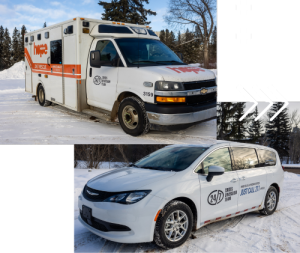HOW TO USE THE PROGRAM
-
Call 211 and press 3.
You’ll be connected with a Crisis Diversion operator who can assess your situation and dispatch a team if needed. -
Who responds.
Crisis Diversion teams attend non-emergency crisis calls referred by EMS, EPS, Peace Officers, or the 211 Hotline. -
Who can call.
Anyone can call, including individuals, businesses, community agencies, or the person needing help. -
What helps most.
The more details you share, the faster and more effective the response will be. Helpful information includes:
• Full name and date of birth
• Physical description
• Exact location and destination
• Any mobility or health concerns -
What to expect.
The 211 operator will provide an estimated wait time. Response times may vary depending on weather, call volume, team availability, and peak hours.
• Peak times are typically between 11 AM and 11 PM in the summer and 11 PM and 6 AM in the winter.
• Priority is given to individuals exposed to extreme weather conditions.
“In a situation where ambulance denied my call for a higher priority, crisis diversion saved my life.”
“Respected me and made me feel like a human being”
“They saved my life when somebody called them for me”

WHEN TO CALL 211
- A person is intoxicated or otherwise impaired
- A person is sleeping in a lobby, or unsafe space
- A person is dressed inappropriately for the weather
- A person feels unsafe, but no threat of violence is present
- A person is confused, disoriented, or may be experiencing a mental health crisis
WHEN TO CALL 911
- A person has overdosed or is not breathing
- A person is violent or is threatening violence
- A person is exhibiting violent behaviour and is refusing to leave
- A large group situation where safety is uncertain
- A person is asleep in a snowbank for an extended period of time
24/7 TEAMS
Trained to De-escalate
Equipped for the Job
HOPE teams use decommissioned ambulances, while Boyle Street teams operate customized Dodge Caravans.
Diverse and Safe
Staff bring diverse experiences and backgrounds. Safety for both staff and clients is always a priority.






